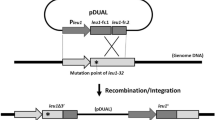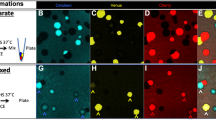Abstract
It is known that some plasmids, such as RP4, can replicate in many Gram-negative bacteria1. Certain small Staphylococcus aureus plasmids have an even broader host range, being able to replicate in not only phylogenetically distant Gram-positive bacteria such as Bacillus subtilis2 or Streptococcus pneumoniae3, but also in the Gram-negative bacterium Escherichia coli4. Here we have examined whether these plasmids can also replicate in a lower eukaryote, the yeast Saccharomyces cerevisiae. For this purpose we constructed hybrids between a S. aureus plasmid pC194 and an E. coli plasmid YIp5, which carries a ura-3 gene easy to select for in yeast but cannot replicate in this host. We found that the hybrids transformed yeast with high efficiency (as did hybrids between YIp5 and three other S. aureus plasmids); were maintained extrachromosomally in yeast; and were not modified during residence in yeast. We conclude from this evidence that S. aureus plasmids can replicate in yeast, which raises the questions of whether the replication signals used by prokaryotes and eukaryotes are similar, and how far up the phylogenetic tree the organisms still able to be hosts to S. aureus plasmids may be.
This is a preview of subscription content, access via your institution
Access options
Subscribe to this journal
Receive 51 print issues and online access
$199.00 per year
only $3.90 per issue
Buy this article
- Purchase on Springer Link
- Instant access to full article PDF
Prices may be subject to local taxes which are calculated during checkout
Similar content being viewed by others
References
Reaney, D. C. Bact. Rev. 40, 552–590 (1976).
Ehrlich, S. D. Proc. natn. Acad. Sci. U.S.A. 74, 1080–1083 (1977).
Barany, F. & Alexander, T. J. Bact. 144, 698–709 (1980).
Goze, A. & Ehrlich, S. D. Proc. natn. Acad. Sci. U.S.A. 77, 7333–7337 (1980).
Stinchcomb, D. T., Thomas, M., Kelly J., Selker, E. & Davis, R. W. Proc. natn. Acad. Sci. U.S.A. 77, 4559–4563 (1980).
Iordanescu, S. J. Bact. 124, 597–601 (1975).
Gerbaud, C. et al. Gene 5, 233–253 (1979).
Hinnen, A. & Meyback, B. Curr. Topics microbiol. Immun. 96, 101–117 (1981).
Primrose, S. B. & Ehrlich, S. D. Plasmid 6, 193–201 (1981).
Thomas, P. S. Proc. natn. Acad. Sci. U.S.A. 77, 5201–5205 (1980).
Novick, R. J. Bact. 127, 1177–1187 (1976).
Gryczan, T. J., Contente, S. & Dubnau, D. J. Bact. 134, 316–329 (1978).
Beggs, J. D. Nature 275, 104–108 (1978).
Iordanescu, S., Surdeanu, M., Della Latta, P. & Novick, R. Plasmid 1, 468–479 (1978).
Bach, M. L., Lacroute, F. & Botstein, D. Proc. natn. Acad. Sci. U.S.A. 76, 386–390 (1979).
Author information
Authors and Affiliations
Rights and permissions
About this article
Cite this article
Goursot, R., Goze, A., Niaudet, B. et al. Plasmids from Staphylococcus aureus replicate in yeast Saccharomyces cerevisiae. Nature 298, 488–490 (1982). https://doi.org/10.1038/298488a0
Received:
Accepted:
Published:
Issue Date:
DOI: https://doi.org/10.1038/298488a0
Comments
By submitting a comment you agree to abide by our Terms and Community Guidelines. If you find something abusive or that does not comply with our terms or guidelines please flag it as inappropriate.



